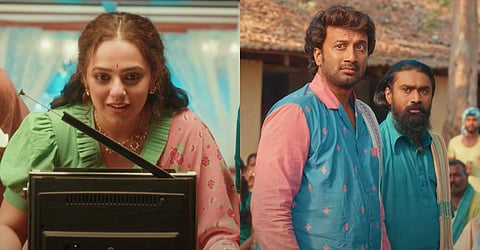Skylab Movie Review: A light-hearted comedy with tons of heart
Rating:(3.5 / 5)
During the opening credits of Skylab, producer Prithvi Pinnamaraju’s name is credited with ‘loved & produced by’ and it shows. The film is made with ample heart and the passion finds different ways to seep into every scene.
Directed by: Vishvak Khanderao
Starring: Nithya Menen, Satyadev, Rahul Ramakrishna
Take, for instance, Shivam Rao’s production design that gives a Wes Andersonesque vibe to the interiors, but never appears “artificial”. Similarly, costume designer Poojita Tadikonda, who has to design for a period setting, doesn’t take the tried-and-tested route of styling men in bottom baggies. Prashanth R Vihari’s lovely score wonderfully captures the varying moods without overselling the emotion. Ravi Teja Girijala’s editing finds simple yet inventive methods to exalt simple scenes and montages. Aditya Javvadi’s camera and lighting are in a duet throughout, and yet the frames never come across as flashy (take the scene where Nithya Menen's character meets her former school teacher in the second half and experiences emancipation of sorts). As mentioned earlier, the team's passion finds its way to seep into every scene. With the technical flourishes so on point, the writing of Vishvak Khanderao, which runs the risk of appearing repetitive, manages to ‘land’ all its intentions towards the end, circumventing the parts of unevenness and monotony.
Skylab is based on the true story of NASA’s first space station named Skylab, which was deorbited in 1979. Speculations regarding the debris hitting the earth, especially India, potentially causing mass destruction spread like wildfire. I remember my mother sharing a childhood anecdote about how people around her celebrated the likelihood of the end of the world. Of course, people perceive potential catastrophes in different ways, I suppose. Skylab is not only about how people of the village of Bandalingampally react to the possibility of the disaster, but also focuses on how this global event changes the leads—Gowri (Nithya Menen), Anand (Satyadev Kancharana), and Subedar Ramarao (Rahul Ramakrishna)—as individuals.
More than the village crumbling in confusion and fear of the unknown, Skylab is about how an event of this scale instigates change among people. This explains why the filmmaker spends the entire first half of the film establishing the characters, their desires, flaws, and more. It is impressive how Vishvak resists the temptation to jump to the more exciting and dramatic part, and almost runs the risk of redundancy. However, it is the repetition that gives a greater payoff to the roles of Gowri, Ramarao, and Anand.
Skylab has several beautifully written characters that go beyond just a one-line description: Gowri, an unsuccessful journalist, is the daughter of the village head; the money-minded Anand, a doctor whose license is revoked, arrives at Bandilingampally to persuade his grandfather (Tanikella Bharani) to lend him the money to regain his license; the unemployed Ramarao, err, Subedhar Ramarao, is indebted to almost everyone in the village, but his grandmother refrains him from taking a job using family honour as an excuse. It also helps that the comedy works to a major extent; take, for instance, a great stretch involving a clarinet in the first half, or the equally funny interactions between Ramarao and his grandmother. They are not the laugh-out-loud kind of humour but the type that ensures there is a constant smile on our faces.
Apart from the leads, Skylab is filled with a host of lovely characters, be it Seenu (Vishnu OI), Gowri’s ever-reliable assistant, Gowri’s former schoolmaster played by Subbaraya Sharma, Ramarao’s prideful grandmother, a little boy who collects the coins the devotees throw in the village’s temple tank, an old Dalit man who is on a mission to sculpt the idol of Rama, and a young Brahmin kid who guides this man, and more! The sheer number of characters that leave a mark speaks volumes of the heart the filmmaker has poured into the film. The best moments in the film, in fact, involve these characters, not just the leads. I do wish the filmmaker delved into the caste angle more, especially in the first half, though.
Heartfelt would be the perfect word to describe the final 30 minutes of Skylab, where its take on casteism, the character arcs, the conflicts, and everything the film had set up until then culminates into a beautiful climax. Gowri writes, “fear united humans on that day”, erasing man-made boundaries like caste, and it’s wonderful how the film explores the repercussions of this potential disaster with a humanistic touch. We start to see the good in humans, we listen to their stories, their fears, and dreams, and that’s when Skylab becomes more than comedy; that’s when it becomes a critique on how we have constricted ourselves, and how liberating it can be when we let go of these demarcations. The ending, in fact, did tear me up.
It’s amusing how Skylab, a film based on events that occurred in 1979, is so relevant in 2021. Like the clueless villagers of Bandilingampally, we are wading through a pandemic where the greater threat keeps metamorphosing from time to time, and yet it’s funny how so many people around us continue to remain obsessed with factors such as caste and religion. At least, I'm glad we have films like Skylab serving as a reminder of what's important and what’s not.

